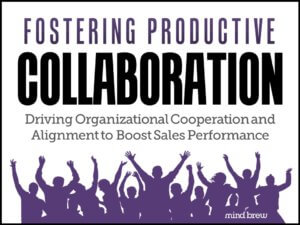More than one sales ops professional has lamented that work would be great if it weren’t for the people. But the truth is that in order to succeed in sales ops, you have to work with other people—including people from other departments.
And that means office politics—managing the perceptions that other people have of you—is just a fact of life.
And most of us would rather suffer death by a thousand paper cuts than have to play office politics.
We sales ops folks tend to be practical and numbers-oriented. The last thing we want to do is worry about how other people see us. Unfortunately, that mindset can lead us to make some pretty big mistakes when it comes to office politics. Here are four of the most common:
- Staying within the “bubble” of sales ops and not interacting enough with other departments. We’ve all heard the saying “Birds of a feather flock together,” and numerous psychology studies show that people tend to choose friends who are just like them. But if you want to succeed in sales ops, you’re going to have to fight against psychology and make some friends who work in other departments. Many of the initiatives that sales ops undertakes require the cooperation of other departments like sales, marketing, product, customer service, or finance. If you have friends in these groups, you’ll have a far easier time persuading them to go along with your plans. If not, you may find them actively working against you. In the worst cases, sales ops teams that were actually doing a good job have had their budgets slashed or have found themselves cut out of important decision-making because they hadn’t cultivated relationships outside of their departments.
- Failing to demonstrate the value of sales ops on an ongoing basis. When you’re interacting with people in other departments, don’t just talk about sports, weather, and what you’re binge-watching on Netflix. Tell them about what your group is doing. Share details about things that are going well, particularly if you have a project that you feel passionate about. And remember that this isn’t just a one-time activity that you can check off your list. Every single week, you should be actively taking steps to demonstrate to management and other people in the company how valuable your team is. Don’t be obnoxious about it, but you also can’t assume that mentioning your team’s good work once a year during a formal presentation is going to get the job done.
- Focusing on activity metrics rather than outcome metrics. When you talk to people about what sales ops is doing, don’t spend too much time emphasizing how busy you are. Most people in the company—and especially the executives—don’t care how many sales reports you create every day. But they might be a lot more interested in knowing that your last project boosted sales by 10 percent or increased quarterly profits by $100,000. These sorts of achievements are worth sharing, and they can help sales ops boost its budget and influence within your organization.
- Focusing on numbers instead of people. When sales ops teams make formal presentations to management about what they’ve accomplished, they often spend the entire time using numbers to highlight their accomplishments. Don’t get us wrong—numbers are really important, especially if they are related to business outcomes. However, they don’t tell the whole story. Making an emotional argument can be incredibly persuasive. In fact, people generally make their decisions based on their emotions and then look for numbers to back up those decisions. So give people the numbers they need, but also give them a compelling story that shows the qualitative value of having a sales ops team—not just the quantitative value.
You may not be interested in playing office politics. And in fact, you should actively avoid the backstabbing and petty maneuvering that most people associate with office politics. But if you want your sales ops team to grow its influence in your company, you have to spend time monitoring and managing the perceptions people have about your group.
The Express Guide How to Boost the Perceived Value of Sales Ops explains this concept in more detail and offers 9 practical steps you can take. It’s a great place to start if you’re currently struggling to get management to recognize your achievements or if you just want to grow your impact within the company.
And we have some other great resources as well–check them out below:














